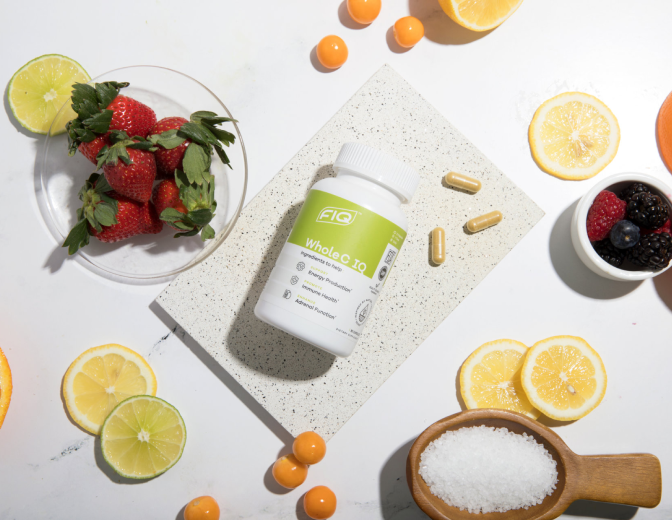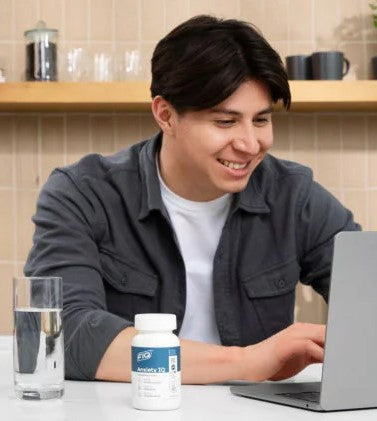Reactive Iron
Iron is essential to life, but too much iron or non-bioavailable iron poses a major problem to health. Our body needs to be able to use the iron that’s present. When it can’t, iron becomes unbound (unliganded) and is able to react with oxygen and other molecules to create reactive oxygen species and oxidative stress.Iron becomes unbound as a result of normal (and abnormal) cell death. When cells die - either naturally at the end of their lifecycle or as a result of inflammation - the iron that’s stored within is released into circulation and surrounding tissues.1,2 The damage caused by unbound iron is well documented.3, 4, 5
The Chicken or the Egg?
The presence of unbound iron results from natural processes. Inflammation can also cause more unbound iron, which leads to even more inflammation—a vicious cycle.In inflammation related to imbalanced iron metabolism, it’s unclear whether the problem begins with the inflammation or iron.4, 5 Excess unbound iron (or poorly bound iron) leads to cellular deather via a process called ferroptosis.6 And inflammation encourages iron storage, leading to anemia of chronic disease.7
For the sake of restoring health, it doesn’t really matter which comes first. What’s important is stopping the process from continuing to happen. This is where turmeric comes in.
A Potent Iron Chelator
Turmeric (specifically the curcuminoids present in turmeric) possesses potent anti-inflammatory properties. What’s more, turmeric is also a powerful chelator of unbound iron,8 so it’s able to intervene and act on both fronts.In animal studies, curcumin was shown to reduce iron accumulation in the liver and spleen of rats with chronic iron overload. It improved antioxidant status in these organs as well.9
Another study in rats found that 6 months of 0.2% dietary curcumin supplementation reduced circulating iron levels but did not affect serum copper or zinc concentrations. The researcher also observed decreased hepcidin (a hormone that promotes iron storage in tissue) and ferritin, along with increased gene expression of proteins that transport iron in and out of cells.10
The Ideal Chelation Therapy
Curcumin is an excellent option for natural chelation therapy for mild or overt iron overload. It is able to easily pass through the cell membrane because of its lipophilic nature.11 It is also able to bind to other unbound metals, including copper, manganese, and lead 12 but it has a much stronger affinity for iron.11While copper is an essential mineral that’s foundational to iron bioavailability, like iron, it can also cause damage when unbound.13Adequate retinol helps maintain free copper levels to support proper iron balance.
At very high levels, curcumin itself can induce cell death, but this induction of cell death is completely abolished when the high-dose curcumin is chelated to iron (i.e., when the cell is also experiencing iron overload).14
Can Turmeric Lead to Anemia?
Some animal studies have proposed that curcumin therapy may induce iron deficiency anemia.10 However, this has not been researched in humans, and there exists only a single case study of iron deficiency occurring in an elderly man as a result of taking iron and turmeric supplements together. It is speculated that the turmeric chelated the iron within the gut, thus inhibiting absorption.15Considering that other more foundational nutrient deficiencies can masquerade as iron deficiency anemia and the prevalence of anemia of chronic disease (aka anemia of inflammation),7 it is unlikely that turmeric should be a cause of concern regarding anemia (though you should always consult with your doctor before beginning any new supplements).
Furthermore, an in vitro study on the iron chelating potentials of curcumin found that it did not inhibit iron from entering the cell in human hepatoma-derived Huh-7 cells.14 Still, curcumin was able to chelate iron and protect these and other tumor cells from further proliferation induced by iron overload.14
A Vital Ingredient in Recuperate IQ
The incredible iron-chelating properties of turmeric are why we chose to include it in Recuperate IQ. This supplement is designed with ingredients that serve as whole-food foundational nutrients that enhance iron bioavailability and utilization within the body while at the same time protecting it from the potential dangers of iron.Imbalances in iron metabolism are often both a cause and a consequence of inflammation.
Turmeric’s ability to activate anti-inflammatory molecules, deactivate inflammatory pathways,16 and improve iron metabolism makes for an invaluable nutrient for health optimization.




